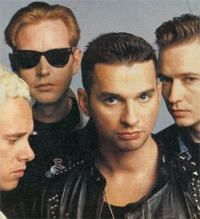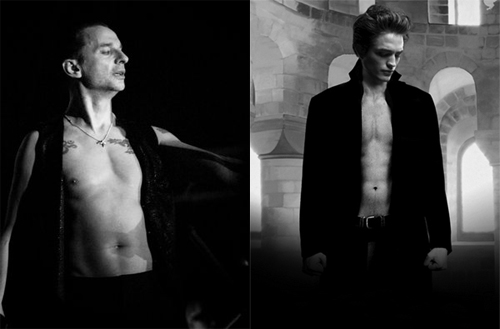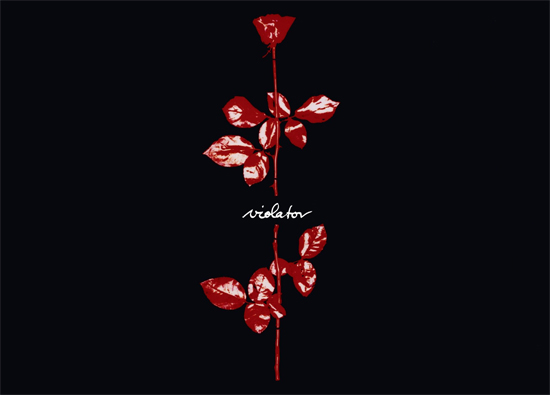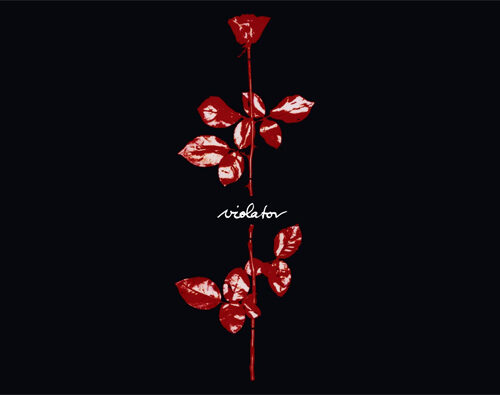My first band T-shirt was a Depeche Mode shirt, bought in the summer of 1990, when I was 13 and Violator ruled the world.
I was damn proud of that shirt and wore it everywhere: at home, at the mall, at the library where I helped out with the kids’ summer reading programme, giving them day-glo stickers for books they read and making suggestions. I was wearing it over my swimsuit at the pool when some older dude looked me up and down, made a face, and asked, "Is that a New Kids on the Block t-shirt" Later, at the library, some little kid asked me the same question.
And anyway, it’s not like wearing a shirt of a band with an album that was soon to go multi-platinum was all that radical. I’d used some money from babysitting to buy my shirt from Sam Goody (like the US version of Our Price) in the mall, and it was on a rack with the Madonnas and Guns and Roses and NKOTBs. Both Depeche Mode and NKOTB filled stadiums across the states that summer; during June and July, their respective World Violation and Magic Summer tours would have rolled into town within days of each other. They probably even used the same hotel suites and backstage bathrooms.
So, similar levels of fame, similar photos, where was the insult? There was no way to articulate it at the time, but it was all about sex. How else to explain all the girls at school with their giant 3" badges from Claire’s and their key rings, bandannas, sleeping bags and scribbled-on notebooks devoted to a bunch of stage school guidos who danced like marionettes? There was something about how NKOTB all smiled angelically for all the pin-up magazines that was just gross: first off, everyone knew that whatever innocent lines they spewed to Tiger Beat about liking pizza and not having found the perfect girl yet (implying that, yes, dear reader, it could be you!) they were most likely cherry-picking roadie-tested fans for coke and kegger orgies after each show. The other options for chart-inspired lust were all hair metallers, waggling their spandex-coated codpieces packed with crotch rot, and they were gross for obvious reasons. But either way, as a young female fan, you could only play into this as a wannabe groupie who bought band merch to ease the statistically likely frustration of not getting any.
But with Depeche Mode you could have an erotic fixation on that wasn’t even necessarily about sex, or specifically not about sex with anyone in the band. The squealing groupie dynamic turned into something dramatic and obsessive, but about mutual longing and cruelty. The songs on Violator were beautifully orchestrated exercises in repressed lust that played the control of Alan Wilder’s arrangements off Dave Gahan’s weary, near-collapse vibrato. Moods shifted from the taunting of ‘Policy Of Truth’s’ “Never again/Is what you swore/The time before” to the pleading of “Put it on/And don’t say a word…” of ‘Blue Dress’. When you’re 13, everything is obsessive and unrequited anyway, so this kind of angst does not read as overblown or silly but really, really hot.
It also helped that the only violation going on here involved breaking skin: every song on Violator is also about drugs, from the skin-popping stomp-vs- twinkle of ‘Personal Jesus’ to ‘Enjoy The Silence’, which proclaims that “All I ever wanted/All I ever needed/Is here/In my arms”, before closing with the sound of a pin (needle?) dropping. When you also consider the tinkling ode to shooting up ‘Waiting For The Night’ (“And when I squinted the world seemed rose- tinted/Angels appeared to descend/To my surprise, with half-closed eyes/Things seemed even better than when they were opened”) and album closer ‘Clean’, with its sweeping arc of celestial hoovers like backwash blood plunging through weak veins, it’s hard to imagine this album is about anything else. (Even when I was getting links for the YouTube videos in the online version of this piece, a lot of the Google ads that popped up were for “addiction treatment and therapy“.)

Then again, if you were looking for objects of teenage lust outside the groupie paradigm, drugs meant Depeche Mode offered the perfect solution. They weren’t interested in just anybody. Thanks to heroin, they probably weren’t that interested in oxygen. So if they chose you, they would treat you like the perfect romantic princess, not some disposable groupie, because you were just that special.
It’s a similar pukey fantasy that sets Twilight fans all aflutter, even if sparkly “vegetarian” vampires are pretty wet and bloodless: the appeal of the cold, impenetrable, brooding dude who singles out an ordinary girl because of something that only he can recognise. I’ll bet there were some Violator fans who had a say in the aesthetics of branding Twilight. Just compare the chests on display in the Twilight: New Moon poster and pictures of Dave Gahan from the time.
But Depeche Mode had an aesthetic that applauded women who were more exciting, more active, more strange. Most of the videos from Violator are stylishly directed by Anton Corbjin with his trademark Cartier-Bresson moody black-and- white haze, and feature cruel, androgynous, arty women. In ‘Policy Of Truth’, they look like something out of Aeon Flux or Wings Of Desire. Fuck this Bella Swan pining shit; these girls are almost mirror images of the guys in the band, down to their tight black trousers, leathers, sunglasses and sculpted hats and hair. They make out with the band against walls and bridges and leave. It’s awesome.
The video for ‘Personal Jesus’ follows the band as they drive through a Mexican desert, looking for a brothel. The girls in the brothel look like the take- no-shit women drawn by the Hernandez brothers. They also look like they could eat the band alive. Sexual puns abound: band members rock in rocking chairs and ride rocking horses; the video ends with cowboy hats tossed on to brass headboards. But half the time the band members are wandering around on display, slightly vulnerable; they’re bare-chested or shot from behind as the prostitutes eye them with contempt.
Even sweeter is the video for ‘Halo’, which I never saw at the time because it wasn’t a hit outside the Modern Rock charts, so therefore aired past my bedtime. It plays on the family of acrobat/clowns in The Seventh Seal. Martin Gore is made up to match a lady acrobat/clown, and the band juggle together while a weedy Dave Gahan flexes his biceps in front of some female dancers in tulle. He’s posing in front of a sign proclaiming him “the strongest man in the universe“ though the dancers look like they could take him in a fight. The sexual power’s shared out pretty equally and it looks like everyone’s having a good time.
‘Personal Jesus’ charted at 28 in the US, ‘Policy Of Truth’ hit number 15 and ‘Enjoy The Silence’ made it all the way up to number eight. These three videos, at least, were in fairly heavy rotation, so all those images could work their magic. This is a much bigger deal than it would have been in the UK, where Top Of The Pops was always a much broader church. Weirdness could sneak in in a way the US top 40 couldn’t allow. Blame a lack of a weekly music press and the vastness you would have to cover to tour in a country with pathetic ten-day holiday allowances (if you were lucky), no dole and 21+ venues.
As a teenager, if you wanted to find out about new music there was college radio and the odd hip older brother or sister, but if you were too young to drive and didn’t know where to even start looking, you were out of luck. The chart stuff that was on the radio, piped through shops, soundtracking films and adverts and your everyday life, was bland and escape was tricky. You found any hints of difference that made it through, like Violator, and latched on.

Violator was a weird UK/US hybrid anyway: think about the snake guitar twang that drives ‘Personal Jesus’, a song allegedly inspired by Martin Gore reading Priscilla Presley’s memoir, Elvis And Me, on long stretches of interstate driving while on tour. Or the soul-boy touches of guitar as distorted harmonica lines on ‘Policy Of Truth’. Or the kitsch plastic Statue of Liberty in the ‘Policy Of Truth’ video. The band had spent a lot of time on the roads over the past few years: the 1987/88 Music For The Masses tour ended up with a huge concert in the Pasadena Rose Bowl that became the basis for the film 101. I love that film for scenes where Depeche Mode’s American tour manager collects some lucky American fans to join the tour, and how at ease everyone seems.
Another thing about that summer of 1990, when I wasn’t at ease about anything: I remember reading one of my mom’s copies of Newsweek, and somebody had cooked up a typology of teenage tribes; the one that caught me was the Video Vogues, who were described as kids with “sharp heads, clunky shoes. They’re suckers for anything Euro.” That’s pretty lame, but I guess at 13 what I was looking for was some kind of definition like that, some kind of solidarity. The local version of the Video Vogues were the art fags. These kids, mostly older, became my heroes, because they smoked cloves, wore lots of black, and were the closest thing I could imagine to living in a Depeche Mode video. Their leader was a trenchcoated guy everyone had a crush on – he had a dyed- black asymmetrical flop of hair that covered half his face, and when he was working at his job at Chick-fil-A in the mall, he had an actual name tag that read “Art F”.
You grab what sneaks through. Even that term, “art fag”, (or its later near synonym, “Eurotrash”) as a badge of pride and arty otherness is ambivalent, and only really works when you’re living in the middle of mall-world, don’t know (or know you know) any real live gay people, and lack the vocabulary or critical tools to find a label that doesn’t take local pejoratives as givens. For all of us stranded in that pre-internet cultural desert, what it really meant was that we just knew what we didn’t want to be like, and defined ourselves in opposition. Eurotrash? Really? Most of us thought Mike Myers’ Saturday Night Live character Dieter from Sprockets was actually more cool than comedic, and most of us
didn’t even have passports. It was all kind of stupid and clueless, but when you’re young and stumbling towards the future, that’s how it goes.
Ultimately, Violator was a gateway drug that primed me for all kinds of things, including a less-than-critical Anglophilia. On its own, it is still a magnificent record that makes me smile and not cringe while remembering. And I’m glad to see there is still some small space for cracks to let in the weird in the US chart- pop landscape. You know who opened for NKOTB’s 2008 sold-out US reunion tour? Lady Gaga.



